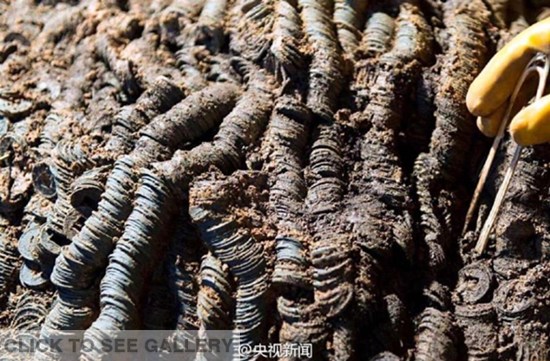An archaeologist shows ancient coins unearthed at a royal tomb in East China's Jiangxi province. Archaeologists uncovered a total of two million copper wuzhu coins from the imperial tomb for the Marquis of Haihun State near present-day Nanchang. (Photo/Weibo account of CNTV)
Nearly 3,000 wooden tablets and bamboo slips have been discovered in a tomb in Jiangxi Province as of Monday, revealing details of life of ancient people 2,000 years ago.
Lead archaeologist Yang Jun said, the written records unearthed in the main tomb of Haihunhou, or Marquis of Haihun, were copies of reports submitted to the emperor and the empress dowager, as well as medical and agricultural books dating back to the Western Han Dynasty (206 B.C.- 25 A.D.).
Two teams have been set up to preserve and decipher the precious documents, the provincial archaeology institute said.
Haihun was the ancient name of a tiny vassal in north Jiangxi. Located in the now provincial capital of Nanchang, the Haihunhou cemetery covers 40,000 square meters with eight tombs and a chariot burial site, with walls that stretch for almost 900 meters.
The team discovered on Sunday five well-preserved horse-drawn vehicles, each with four sacrificed horses in the corridor of the main tomb. More than 3,000 accessories embellished with gold and silver were found at the same time.
The archeologists suspected that the main tomb might be that of Liu He, grandson of Emperor Wu, the greatest ruler of the Han Dynasty, which witnessed a fairly long period of social stability and prosperity.
Liu was given the title Haihunhou after he was deposed as emperor after only 27 days, dethroned by the royal clan due to, allegedly, his lack of talent and morals.
The excavation began in 2011. The next stage of the archeological work, the institute said, will look for items locked in the coffin of the central mausoleum.



















































